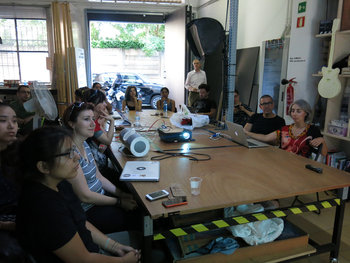
Not My Job
A hands-off culture whereby every role in an organization has specific inputs and outputs such that people aren't flexible or responsible for the overall success of things. For example, a software developer who notices a major security flaw who does nothing because they aren't a security expert.Bureaucratic Culture
A culture with well defined processes, procedures, controls and policies such that it may fail to handle dynamic situations well. For example, a vehicle manufacturer that asks a customer to resubmit their order 4 times over 3 months because of detection of exceptions in the order by various bureaucratic processes. Such a process may be mature and controlled but completely fails the customer and brand.Scientism
Scientism is science as an ideology whereby it is viewed as more certain, infallible and applicable than it is in reality. This shouldn't be confused with science itself which is founded on challenge such as peer review. Scientism implies intractable groupthink or misleading claims vaguely based on science. For example, experts that claim to be able to centrally control an economy based on the science of economics whereby they may overstate the certainty and applicability of economic theory.Myopic Optimization
A society, organization or team that is overfocused on optimizing a single number or a small set of numbers such that thousands of other variables can go astray. For example, a bank that is focused on increasing sales of a particular product that loses sight of customer experience, risk, compliance, ethical and reputational issues.Cold Logic
Cold logic is the failure to consider humans in human decisions. For example, a doctor with a technical understanding of medicine who fails to communicate well with patients, to take their concerns seriously or to adapt to their needs.Division of Labor
The division of labor is an industrial-era productivity innovation that organizes work into highly specialized roles. This is unquestionably efficient in simple scenarios such as a production line that wants to produce widgets as cheaply as possible. More complex pursuits benefit from generalists who understand processes end-to-end. For example, a software organization dominated by specialists that develops unreliable and unusable software and services because nobody in the organization understands the firm's architecture, customer needs or the root cause of problems.Glittering Generalities
In some cases, expert cultures are based on glittering generalities and thought-terminating cliches such as "best practice" and "evidence based." They can also be perpetuated by biases such as the invalid assumption that anything that is based on a measurement, calculation, standard or expert advice is logical and correct.Industrial Thinking
Expert cultures can result when you apply industrial-era approaches to a more complex knowledge economy. In an industrial economy, it made sense to train an employee to fix a single type of machine or complete a single step in a process. This can be problematic in a knowledge economy. For example, a business process conducted by 12 teams of specialists with no individual in the entire organization who can accurately explain the end-to-end process or why it feels so broken.Strategy vs Recommendations
Specialists can only offer recommendations in their sphere of specialization and may have a limited overall understanding of the complexity of systems, structures, processes and human factors. Generalists are required for end-to-end tasks such as mission, vision, strategy, decision making, problem solving, organizational culture, influencing, storytelling, stakeholder management, customer experience, branding, process improvement and structural design.| Overview: Expert Culture | ||
Type | ||
Definition (1) | A society, organization or institution that is run by specialists. | |
Definition (2) | A society, organization or institution that is dominated by specialists such that big picture systems thinking, root cause analysis and design thinking isn't adequately applied to complex strategic and operational issues. | |
Type | Culture FailureOrganizational Failure | |
Related Concepts | ||





























